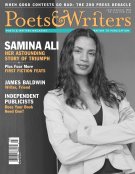In his poem “Spirit Whose Work Is Done,” written in 1865, Walt Whitman summoned the memory of the war that had just ended: “Leave me your pulses of rage! bequeath them to me! fill me with currents convulsive!” he wrote. “Let them identify you to the future, in these songs.” Whitman, who had worked as a “wound-dresser” in Union hospitals during the Civil War, knew how important it was to address in poetry what he had personally experienced. Nearly 140 years later, thousands of U.S. troops are returning from war with their own stories to tell.
In April the National Endowment for the Arts launched Operation Homecoming, a program of creative writing workshops for soldiers returning from combat in Iraq and Afghanistan. The workshops are designed to encourage soldiers and their families to tell their personal stories. “Some of these writings will focus on a singularly challenging moment in life, while others may provide vivid accounts of historical events that rise to the occasion of literature,” said NEA chairman Dana Gioia at a news conference in April at the Women in Military Service for America Memorial in Arlington, Virginia. “American letters will be richer for their addition.”
Operation Homecoming workshops are taught by poets, fiction writers, journalists, and military historians, some of whom are combat veterans. Among the literary writers participating in the program are Richard Bausch, Tom Clancy, Judith Ortiz Cofer, Barry Hannah, Bobbie Ann Mason, James McBride, and Tobias Wolff. Workshops are held across the country, in military bases such as Camp Lejeune, North Carolina; Camp Pendleton, California; Fort Drum, New York; Fort Richardson, Alaska; Hurlburt Field, Florida; and Naval Station Norfolk, Virginia. In addition, overseas workshops are being conducted in Italy.
The program is funded in part by a $250,000 contribution from the Boeing Company, and is sponsored by a partnership of the Department of Defense, the NEA, and the Southern Arts Foundation.
Operation Homecoming also provides soldiers and their families with an online writing tutorial, a CD with interviews and selections from a wide range of previously published wartime writings, including dramatic readings of wartime letters (in a manner reminiscent of Ken Burns’s PBS documentaries), interviews, poems, and samples of fiction. Operation Homecoming: Writing the Wartime Experience, a booklet distributed to the troops participating in the workshops and available as a PDF download from www.operationhomecoming.org, provides biographies of workshop instructors and a short essay on the history of war as a literary subject—from Homer’s Iliad to Hemingway’s A Farewell to Arms—written by Dana Gioia. “One cannot tell the story of our nation without also telling the story of our wars,” he writes. “And these often harrowing tales are best told by the men and women who lived them.”
In addition to facilitating Operation Homecoming workshops, the NEA is accepting submissions of essays, letters, and other writing related to recent military service from active military personnel and their families for an anthology that will be published next year. The anthology will be given to military installations, schools, and libraries, and sold in bookstores. A percentage of any proceeds will go to military charities. A panel of “literary experts” assembled by the NEA will review the entries. The deadline for submissions is December 31.
Andrew Feld is the writer-in-residence at Carthage College in Kenosha, Wisconsin. His first collection of poems, Citizen, a 2003 National Poetry Series selection, was just published by HarperCollins.








